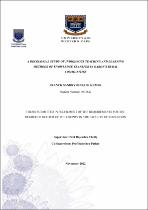A decolonial study of indigenous teaching and learning methods of knowledge transfer in Gabon’s rural communities
Abstract
Gabon is a country with an important ancestral cultural heritage that constitutes a set of
epistemological and ontological systems that can be traced back to the 15th century.
Europeans, with their colonising mission, wrongly presumed that African indigenous
people were ignorant and uneducated. Thus, Gabon remains one of the sub-Saharan
countries where access to education and forms of knowledge is exclusively established
on the Western hegemonic knowledge system. This study demonstrates how indigenous
knowledge contributes to education in Gabon via the implementation of indigenous
teaching and learning methods of knowledge transfer. The theoretical framework
underpinning the present study is based on decolonial theory as conceptualised for
research in the humanities, social sciences, and education.

